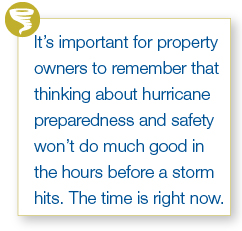Hurricane season typically runs from June 1 to November 30 each year, which is when 97% of all Atlantic tropical cyclones occur. However, there have been 69 off-season storms recorded in the Atlantic hurricane database, which began in 1851. The annual boundaries continue to blur.
Researchers at MIT concluded in a recent study that tropical cyclones are likely to become stronger and more frequent in the North Atlantic across the calendar, where about 12 percent of the world's hurricanes unleash their fury each year. As we anticipate hurricane “prime time,” it’s important for property owners to remember that thinking about hurricane preparedness and safety won’t do much good in the hours before a storm hits. The time is right now. 
Check Your Homeowners’ Policy
Most basic
homeowners’ policies contain at least some hurricane coverage. But beware, HUB International insurance experts have seen too many clients wind up with a large claim and inadequate means of recovery. In many cases, the coverage offered by your homeowners’ insurance only allows for damage done by storm winds, not the rain damage or flooding that comes with them.
Check with your HUB broker to see if you live in a low hazard or high hazard flood zone and whether you need to obtain flood coverage, which is written through the National Flood Insurance Program. But remember: underestimating your flood risk can be a costly gamble. As the victims of
October 2012’s Hurricane Sandy learned the hard way, you don't need to be located in a coastal area to be at risk for cyclone-related flooding.
It is also important to understand additional policy coverage limitations and policy exclusions. For example:
- Does your policy pay replacement cost or actual cash value for your residence and contents?
- Does your policy cover additional living expenses, such as the cost of a hotel if your residence is temporarily uninhabitable?
Develop a Plan
An emergency response plan, when properly developed, rehearsed and executed, can greatly reduce the damage to your home - and more importantly, keep your family safe. The plan should identify specific steps to take before, during and after a hurricane. Some important components of a successful plan:
- Stay Informed - Follow local news updates. If a hurricane is brewing, you’ll need to know if you’re in an evacuation area. Please adhere to instructions issued by local officials. Leave the area immediately if ordered. Assess your risks and your home's vulnerability to storm surge, flooding and wind and do what you can to cover windows, etc. as long as conditions remain safe.
- Stock Up on Supplies - Assemble a basic disaster supplies kit with first aid remedies, flashlights, batteries, non-perishable food, bottled water and any other necessities. Consider placing a couple of these kits throughout the home in the event that storm damage should render a section of the property unsafe.
- Contact Your Broker - As soon as the storm clears and the conditions have improved, get in touch with your HUB broker to start the claims process. He or she will understand your anxiety and stress and will do everything possible to get you and your family quickly back on your feet.
Considering your insurance coverage options, taking preventive measures and developing a hurricane emergency response plan now will help minimize damage to your property and valuable possessions and keep you and your family safe.
Download our Hurricane Safety Checklist for more information, including loss prevention tips to protect your fine art and collectibles.